Search the Special Collections and Archives Portal
Search Results
William "Mike" Edwards oral history interview
Identifier
Abstract
Oral history interview with William “Mike” Edwards conducted by Lisa Campbell and Anna Marie Crosby on August 01, 2001 for the Public School Principalship Oral History Project. In this interview, Edwards reflects upon his 30-year career as a teacher and administrator with Nevada’s Clark County School District (CCSD) from the 1960s to the 1990s. He discusses training that he feels is the most important for a teaching career, and how his own training prepared him for his career in education. He describes his regular responsibilities as principal, and challenges that he faced as principal of Rancho High School during the 1960s and 1970s. He provides his perspective on contemporary educational issues such as curriculum development and student ethics, and discusses his own approach to school administration.
Archival Collection
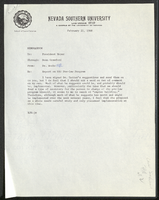
Nevada Southern University law program: reports and correspondence
Date
Archival Collection
Description
Folder contains memorandums, correspondence related to the law program at Nevada Southern University (later UNLV). It includes a report on the NSU law program (fall term 1967-1968), a report of the Association of American Law Schools Committee on Guidelines for New Law Schools (1966), and a report of Dean Willard H. Pedrick, Arizona State University College of Law (1967). From the University of Nevada, Las Vegas William S. Boyd School of Law Records (UA-00048).
Text
Walter V. Long Photographs
Identifier
Abstract
The Walter V. Long Photographs consist of three black-and-white photographic prints and corresponding negatives dating from approximately 1923 to 1966. The photographs include two formal portraits of Walter V. Long and one image of him as a teacher with the Tonopah High School Band in Southern Nevada.
Archival Collection
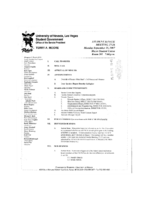
Meeting minutes for Consolidated Student Senate University of Nevada, Las Vegas, September 15, 1997
Date
Archival Collection
Description
Text

Sandra Candel oral history interview: transcript
Date
Archival Collection
Description
Oral history interview with Sandra Candel conducted by Elsa Lopez, Monserrath Hernández, and Barbara Tabach on October 03, 2019 for the Latinx Voices of Southern Nevada Oral History Project. Sandra Candel talks of her childhood growing up with her grandparents in Guadalajara, Jalisco after her mother immigrated to America. She moved to California to attend university before moving to Salt Lake City, Utah, where she raised her children and began homeschooling them. This path led to Sandra opening a Montessori school, igniting her interest in education. She talks of her pursuit of both a Masters Degree from Drexel University and a Doctoral Degree from the University of Nevada, Las Vegas (UNLV). Sandra concludes her interview with discussion of her research and current employment as a part-time instructor for the Department of Interdisciplinary, Gender, and Ethnic Studies at UNLV. Subjects discussed include: Guadalajara; Salt Lake City, Utah; Sensitive Teaching Practices; Multi-generational families.
Text

Transcript of an interview with Gertrude Rudiak, Richard Rudiak, and Dani Ramage by Barbara Tabach, December 30, 2015
Date
Archival Collection
Description
On December 30, 2015, a few months after her 100th birthday celebration, Gertrude Rudiak, with the help of her son Richard Rudiak and granddaughter Dani Ramage, reminisced about living in Las Vegas since 1946, nearly eighty years. They explore the ancestral roots of Gertrude (n?e Rightman) and of her deceased husband George Rudiak. Their courtship and marriage at the brink of World War II and George?s enlistment in the US Army Corps is what brought the couple to Las Vegas and the gunnery school which is now Nellis Air Force Base. After his tour of duty, George settled into a law practice where he specialized in quickie-divorces, but also carved out a reputation supporting civil rights and working for legislation to eliminate working and living discrimination of blacks in Nevada. Gertrude was an active member of Las Vegas. She played the pipe organ, hosted large Seders at Passover and managed the Rudiak household that grew to include five children. Over her long life, Gertrude embraced many positions on community boards, including being Temple Beth Sholom?s first female board member. She was also a teacher in both secular and Jewish education. Her efforts have been recognized by the Jewish National Fund, the United Jewish Appeal, and the Anti-Defamation League. Additionally, Mayor Carolyn Goodman presented Gertrude with the distinguished honor of a key to the city of Las Vegas in 2014. The city declared August 2, Gertrude's birthday, Gertrude Rudiak Day in recognition of her long-standing commitment to Las Vegas.
Text

Transcript of interview with Norman Christiansen by James Courtney, November 28, 1986
Date
Archival Collection
Description
Text
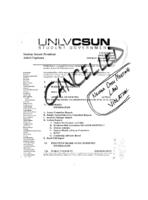
Meeting minutes for Consolidated Student Senate, University of Nevada, Las Vegas, December 05, 2005
Date
Archival Collection
Description
Text
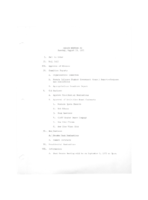
Meeting minutes for Consolidated Student Senate, University of Nevada, Las Vegas, August 19, 1975
Date
Archival Collection
Description
Text
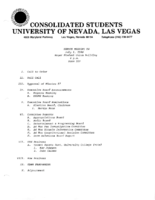
Meeting minutes for Consolidated Student Senate, University of Nevada, Las Vegas, July 01, 1980
Date
Archival Collection
Description
Text
